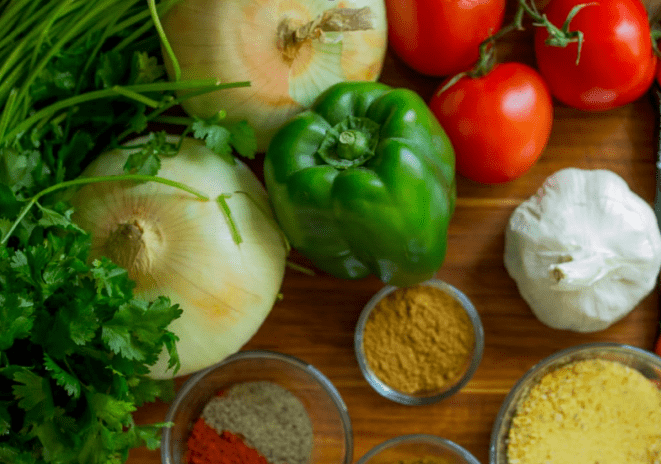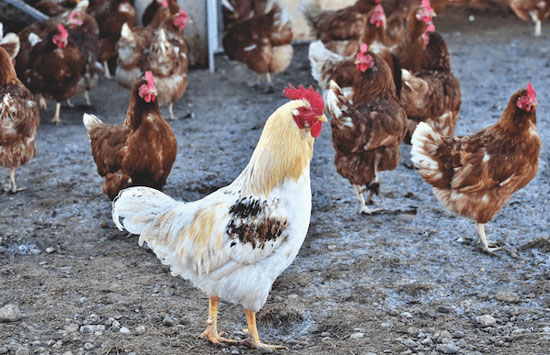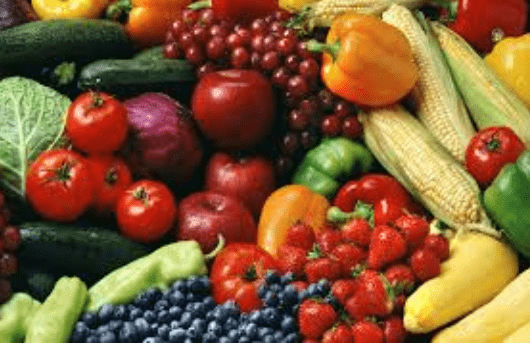Introduction: The Complete Benefits of Organic Food and a Rundown on Organic Food Facts
You are what you eat, or so the saying goes. With our current, industrial food system, much of what’s available on grocery store shelves is an assortment of corn, soybeans, wheat, and a variety of unpronounceable chemicals and food additives.
As more and more people begin to question the modern food industry, organic food is quickly becoming the desired alternative.
Though the organic food industry is growing by leaps and bounds mainly due to consumers wanting healthy alternatives to what they find in the main aisles of their local grocery store, most people don’t understand a simple organic food definition.
Furthermore, different governmental and private organizations have different organic food definitions, making it even more confusing for people who are simply looking for a way to add healthy, wholesome foods to their everyday diet.



Organic Food Definition
In this brief article, AdvisoryHQ will look at the benefits of eating organic food and organic fruits and vegetables. We begin by comparing organic food products to the typical diet of people who eat what the industrial food system offers.
We then offer an organic food definition offered by several leading players in the organic food industry.
Next, we turn our attention to how organic food is growing as an industry and becoming a major player in the national food economy. Since many people only consider organic fruits and vegetables to be part of the organic food industry, we also look at the wide array of organic food products on the market today.
Lastly, we offer a list of organic food facts and the benefits of organic food both for a healthier body and a healthier environment.
See Also: Organic Farming Definition, Advantages, and Disadvantages
What Are You Eating? | The Benefits of Eating Organic Food Versus the Alternative
If you have ever tried to read the ingredient list on the nutrition label on the back of a box or can of food, chances are that there are a number of words that you find pretty hard to pronounce.
While eating organic food ensures that you will be eating “real food” that comes from a living plant, the industrial food system produces food products that are filled with additives, antibiotics, hormones, pesticides, and the like.
According to sustainabletable.org, “In an attempt to feed more people in an easier and more productive way, food has become food ‘products’ full of chemicals, not real food.
This denatured food contributes to diseases that are shortening the human lifespan for the first time ever. Obesity, cancer, heart disease, high blood pressure, and diabetes are at an all-time high, and most of these diseases are controllable by the food we consume.”
The organic food benefits that so many people seek out have become such a consumer priority precisely because of the damaging health effects that the industrial food system has caused.
Whereas the benefits of organic food help to reduce cholesterol, control blood pressure, and avoid diabetes by offering essential nutrition with fresh foodstuffs, much of the industrial foodstuffs we eat lead to serious health issues.
The benefits of organic food, however, don’t only apply to organic fruits and vegetables. The industrial food system has introduced genetic engineering into the agricultural sector, leading to a number of possibly severe health issues.
Genetically modified organisms, or GMOs, make up the majority of the primary food crops our farmers produce. These crops have genes from different organisms “spliced” into their DNA to supposedly offer advantages to the farmer. However, unlike organic food products, GMO food products can potentially cause damage to human health, including increasing allergies and other unforeseen consequences.
In the dairy industry, the United States allows farmers to inject their milk-producing cows with recombinant bovine growth hormone (rBGH). This hormone helps cows to increase their milk production, though there is convincing scientific evidence that this hormone could be possibly carcinogenic to humans.
One of the main organic food benefits, when compared to the industrial food alternative, is that you know what you are eating; eating organic food leaves you in control of what goes into your body. An apple is an apple, while industrially-produced applesauce may include a number of unpronounceable ingredients that are a mystery to you.
Don’t Miss: Top Organic Farming Methods | Guide
All-in-One Change Management Tools
Top Rated Toolkit for Change Managers.
Get Your Change Management Tool Today...
An Organic Food Definition
If you want more control over what you are putting into your body and want to seek out the benefits of organic food, the first thing you need is an organic food definition. Not all people agree on one, universal organic food definition, and different standards are applied for certain organic certification processes. Below, we will look at an organic food definition offered by three leaders in the organic food industry.
- Organic Food Definition by Organic.org: “Simply stated, organic produce and other ingredients are grown without the use of pesticides, synthetic fertilizers, sewage sludge, genetically modified organisms, or ionizing radiation.Animals that produce meat, poultry, eggs, and dairy products do not take antibiotics or growth hormones.”
- Organic Food Definition by the United States Department of Agriculture (USDA): “Organic is a labeling term that indicates that the food or other agricultural product has been produced through approved methods.The organic standards describe the specific requirements that must be verified by a USDA-accredited certifying agent before products can be labeled USDA organic.”
However, it is worth noting here that the USDA allows for “organic food” to contain up to 5% of ingredients that can be considered as synthetic additives or chemicals. Organic fruits and vegetables that have the USDA organic label on them might very well be grown with an institutionally accepted amount of herbicides, pesticides, and other chemicals.
- Organic Food Definition by the Department for Agriculture and Rural Affairs (DEFRA) of England: “Organic food is the product of a farming system which avoids the use of man-made fertilisers, pesticides; growth regulators and livestock feed additives.Irradiation and the use of genetically modified organisms (GMOs) or products produced from or by GMOs are generally prohibited by organic legislation.”
Related: Best Organic Gardening Tips | Guide | How to Start an Organic Garden
The Growing Organic Food Industry
As more and more people begin to learn about organic food facts and the benefits of organic food, the demand for organic food has never been greater. In fact, the sale of organic food has been growing by 20% annually and is on pace to make up 3.5% of the U.S. food market in the next couple of years.
Besides the health benefits of organic food, the growing organic food industry has also stimulated other areas of the economy. Local food economies are centered around organic fruits and vegetables and other organic food products. Farmers markets, community supported agriculture programs, and other community organizations centered around organic food have given a needed helping hand to small, family farms that have found a reliable, niche market for their organic food products.
Furthermore, as more people have learned of organic food facts and organic food benefits, conventional grocery stores have been expanding their offer of organic food products. Most produce sections at local grocery stores now have a sizeable section of organic fruits and vegetables.
Additionally, grocery stores like Whole Foods have popped up around the nation. These grocery stores market 100% organic food. Enough of the population has learned about the benefits of organic food that new businesses are being created to meet the growing demand.
Popular Article: Top, Organic & Famous Low-Calorie Sports Energy Drink Brands (Comparison Reviews)
Organic Food Products Beyond Just Organic Fruits and Vegetables
While the majority of consumers only think of the benefits of organic food related to organic fruits and vegetables, there are a whole variety of organic food products that also bring organic food benefits.
Bread is one of the staples of the American diet. Unfortunately, the vast majority of the wheat that we consume is grown with pesticides and other agro-chemicals. One of the most unique organic food facts is that organic bread made from pesticide-free wheat is considered to be a viable alternative for people who fear they can’t eat gluten due to mild celiac disease. You can also find other organic food products made from wheat, including organic cereals.



Benefits of Organic Food
Organic cheeses and organic meats are two other organic food products worth considering for a healthier diet. Organic cheeses and other dairy products are produced from milk that doesn’t have any sort of added hormones.
One of the organic food facts that few people know about is that organic sources of meat and animal-based products like eggs are usually produced from free range animals. Free range animals are raised on pasture and not in concentrated animal feeding operations (or CAFOs), which have thousands of animals penned up in sometimes cruel conditions. Free range animals almost always have much better nutrition, which is another of the benefits of organic food.
Read More: Best Banana Bread Recipe | Guide | Easily & Quickly Make Banana Bread
Organic Food Facts and Organic Food Benefits
If you still are not convinced to make the switch to consuming organic food as the mainstay of your diet, consider the following organic food facts related to the benefits of organic food.



Organic Food Products
- 10,000 American farmers made the transition to organic farming on over 2 million acres of land.
- Organic farms have a lower environmental impact than conventional farming methods.
- Organically produced tomatoes have much higher levels of needed antioxidants than conventionally produced tomatoes.
- Organic fruits and vegetables grown on healthy soils without chemical fertilizers have much higher levels of micronutrients that our bodies need.
- Free-range animals raised on pasture have a much higher CLA (conjugated linoleic acid), which is a good fat that helps improve heart health.
- Organic food and meat raised without antibiotics help to limit antibiotic resistance, a dangerous trend in America today.
These organic food facts should leave little room for doubt that switching to a diet based on organic food is by far a healthier option for your wellbeing.
Conclusion – The Benefits of Organic Food for a Healthier Lifestyle
When you take into account all of these organic food facts, it seems like common sense to switch to eating organic food.
While many people may argue that organic food products are significantly more expensive, it is possible to lower the cost of organic food through signing up for a community-supported agriculture program, which will get you discounted organic fruits and vegetables during the entire growing season.
Once you have learned an organic food definition, you might even be tempted to grow your own garden to have an abundant supply of organic fruits and vegetables growing right behind your home. Even if you live in an area without a lot of green space, a few tomato plants grown on your windowsill can go a long way.
The benefits of organic food are simply too good to ignore. With the organic food industry growing every day, it is easier than ever to make the switch to organic food to improve your health and protect the planet.
- https://www.pexels.com/photo/assorted-vegetables-and-spices-on-wood-surface-128402/
- https://pixabay.com/photos/hahn-gockel-chicken-hen-poultry-4872601/
- http://www.preventcancernow.ca/confused-don%E2%80%99t-be-organic-food-is-better-for-you/
AdvisoryHQ (AHQ) Disclaimer:
Reasonable efforts have been made by AdvisoryHQ to present accurate information, however all info is presented without warranty. Review AdvisoryHQ’s Terms for details. Also review each firm’s site for the most updated data, rates and info.
Note: Firms and products, including the one(s) reviewed above, may be AdvisoryHQ's affiliates. Click to view AdvisoryHQ's advertiser disclosures.







